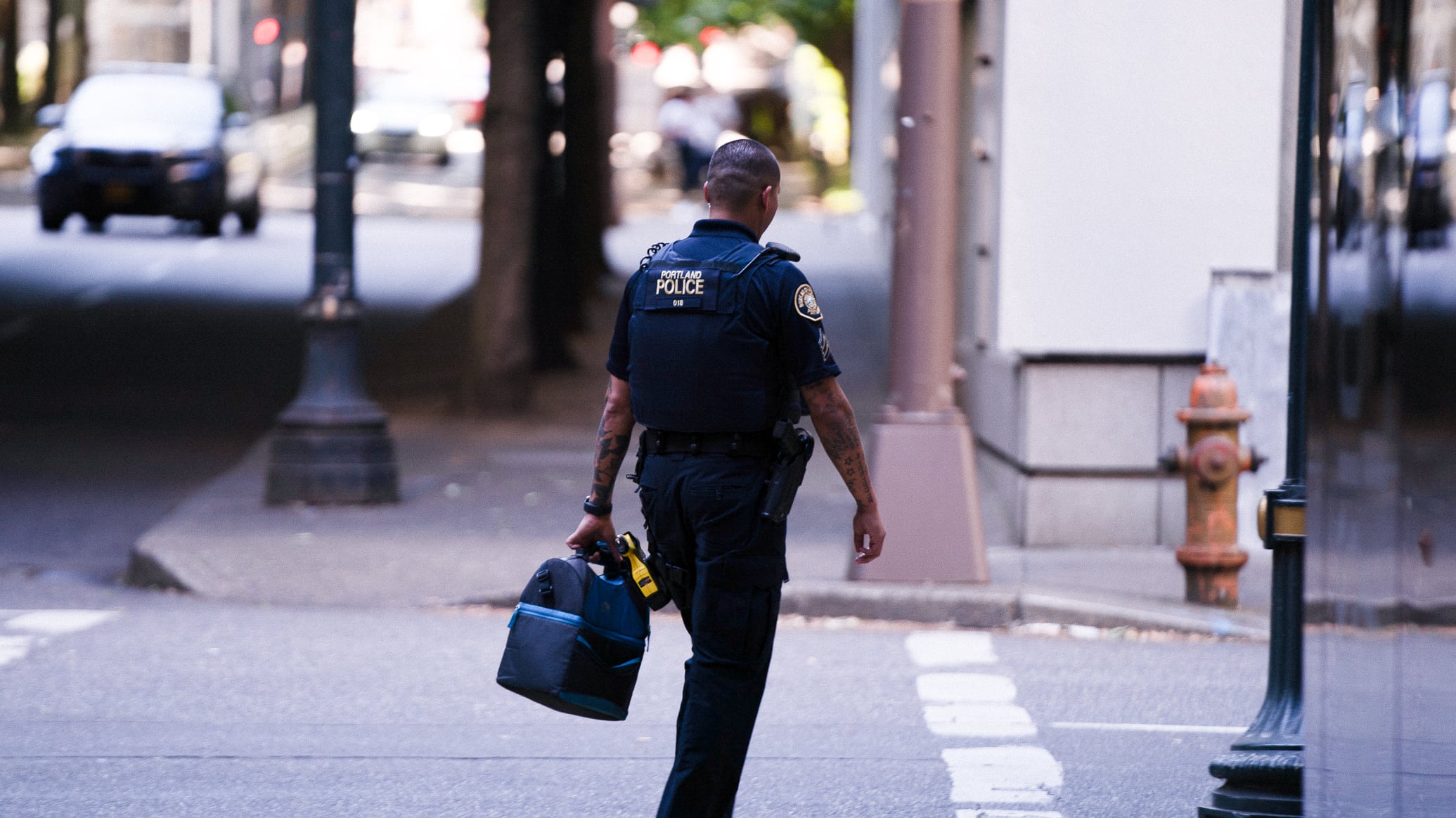A dispute has ruptured the local labor movement in recent weeks over the Portland Police Association’s attempt to join the Northwest Oregon Labor Council, the state’s largest labor union guild.
Here’s what will happen soon—and what led up to it.
WHAT HAPPENS APRIL 28: That’s when delegates from the 104 unions in the Northwest Oregon Labor Council vote whether to accept the Portland Police Association into the guild.
The vote of the full membership comes more than a month after NOLC’s executive board, which consists of 21 members, voted March 10 to admit the police union into the organization.
And while at the time that appeared to be the final stamp of approval, critics of PPA’s admittance—most vocally the Portland chapter of the Democratic Socialists of America—fought back, saying NOLC hadn’t gone through the proper channels to admit the police union into its ranks.
So NOLC reversed course. Laurie Wimmer, NOLC’s executive secretary-treasurer, says she will now send PPA’s admittance to a vote of the full membership. The 104 unions each send delegates to the monthly meetings. The number of delegates exceeds 400, but attendance at NOLC’s monthly meetings rarely, if ever, gets close to the full membership.
“We wanted to err on the side of union democracy and give every voice the opportunity to be expressed,” Wimmer tells WW. “We’ll let union democracy prevail and ask everyone to respect that outcome.”
Wimmer says NOLC’s governing rules do not make clear the process for admitting a union into the organization. She says the admittance process was never a problem—until the PPA tried to join. A copy of the council’s constitution does suggest that the full council must approve of new affiliates, stating that the executive board “shall investigate the application and make a recommendation to the Council, as soon as practicable.” Wimmer said this passage, however, does not call for a vote “as other passages in the document clearly do.”
WHY THE PPA WANTS TO JOIN: Wimmer says local labor organizations must maintain a united front against the Trump administration, which has signaled its distaste for organized labor.
“We think especially in these times, with the nightmare at the federal level,” Wimmer says, “we need to be as united and powerful and as diverse as possible to be able to stand together and fight the threats to unions and democracy.”
Wimmer says she’s been trying to grow NOLC’s membership for years, and that discussions between her and PPA president Aaron Schmautz weren’t novel.
“Not partnering has never been a solution to anything,” Schmautz says, saying that a strong labor alliance will also help local unions tackle rising health care costs together. “Partnership is essential.”
WHO DOESN’T WANT PPA TO JOIN: The party most opposed to the police union’s inclusion in NOLC has been the Portland chapter of the Democratic Socialists of America, to nobody’s surprise.
Two members of the DSA, who both belong to trade unions within the council, wrote an opinion piece on the Portland DSA’s website this week lambasting NOLC’s decision to welcome PPA.
“As trade unionists, we see through this cynical attempt by the police to shield themselves from accountability and budget cuts,” wrote Erica Thomas and Gabriel Erbs on April 6. “They’ve gotten used to bloated personnel and equipment budgets, absurd overtime payouts, and immunity for violent misconduct. But with four socialists elected to City Council, the police union is suddenly trying to brand itself as a ‘friend of workers.‘”
The Portland DSA also started a petition to fight the move.
“The effort to bring the PPA into the Labor Council represents a total repudiation of core labor values,” the petition says.
Critics of NOLC’s move say the police union is joining NOLC only because it believes it has a higher chance of averting budget cuts to the Portland Police Bureau.
PPA president Aaron Schmautz disputes that. “None of these conversations have been transactional,” Schmautz says. “Our desire to engage predates this budget cycle. This budget cycle is not the originating factor in our desire to deepen our relationship with labor.”
THE POLITICAL BACKDROP: Though DSA opposition may have meant little in city politics a year ago, four members of the new 12-member City Council are friendly to the socialist movement: Councilors Sameer Kanal, Angelita Morillo, Mitch Green and Tiffany Koyama Lane. That’s a third of the council—real sway.
But organized labor has even greater traction. All 12 of the new councilors were described by Wimmer after the fall election as “labor-friendly endorsed candidates.” The Northwest Oregon Labor Council endorsed eight of the 12 current councilors.
PPA and NOLC’s desire to link arms also comes at a delicate time for the police union, which since the start of the new year has clashed several times with city councilors who are vocal critics of the Police Bureau.
Twice now, Councilor Sameer Kanal has inflamed tensions with the police union: first over possible cuts to the Police Bureau budget, then over a policy he sought that would have made small tweaks to the city’s future police accountability body.
Councilor Angelita Morillo more recently questioned Police Chief Bob Day about an aggressive police presence at two mutual aid events in the Old Town neighborhood. “It seemed like a really heavy use of police resources in the evening,” Morillo said, “for something that was relatively benign.” (Two people were later arrested for vandalism and trying to break in to The Society Hotel as the neighborhood dispute escalated; Morillo’s remarks preceded that incident.)
On the issue of PPA’s admittance to the NOLC, though, city councilors appear to be keeping mum until the vote April 28 takes place.
Councilors Mitch Green, Kanal and Morillo declined to comment.
Councilor Steve Novick did comment, quoting an oft-butchered remark by Lyndon B. Johnson, who once said of FBI director J. Edgar Hoover, more or less: “It’s probably better to have him inside the tent pissing out, than outside the tent pissing in.”
